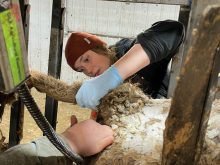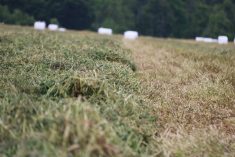RED DEER, Alta. – Injecting dairy cows with growth hormones to increase milk yields is gaining international acceptance, yet some researchers say they still don’t know enough about the side effects of supplements like bovine somatotropin.
Australian animal scientist Ian Lean from the University of Sydney said there’s considerable unpublished research on supplements like BST and monensin. He said all the material should be pooled to analyze and compare the effects of the hormone supplements.
Management practices and herd health treatment regimes are variable so effectiveness of the hormones also varies.
Read Also

Foot-and-mouth disease planning must account for wildlife
Our country’s classification as FMD-free by the World Organization for Animal Health has significant and important implications for accessing foreign markets.
Research claims BST doesn’t harm an animal’s health but Lean says too few herds have been monitored.
“They haven’t had enough numbers of animals to make that statement with any degree of confidence whatsoever,” he said at the recent western dairy seminar here.
Advantages of hormone
Directing his talk on BST and monensin trials in Australia, he outlined some of the advantages.
BST is permitted in the United States, Mexico and South Africa. BST and monensin are not legal for use on dairy cattle in Canada.
A Canadian decision on BST use isn’t near approval, said an official with Health Canada in a later interview.
The department is reviewing side effects the hormone might have on human and animal health and has asked the manufacturer, Monsanto, to produce more data, said Bonnie Fox-McIntyre.
“Monsanto says it could take 12 months or more to provide the data on animal safety.”
She wouldn’t reveal Ottawa’s concerns with BST. The bulk of department information has come Monsanto so it is also examining independent reviews of the hormone.
Somatotropin occurs naturally in cows and is produced in the pituitary gland. BST doesn’t substantially increase an excellent cow’s yield but it will improve an average cow’s production and keep her milking longer.
BST is not a wonder drug, he said.
“Not in all cases have cattle produced as well on BST in the second lactation as the first lactation.
“It raises the issue as to whether these animals are able to adapt as elegantly as suggested to the impact of BST,” he said.
The synthetic hormone appears to impair fertility but if a cow milks longer the need to get pregnant regularly may not be necessary.
Some evidence suggests susceptibility to lameness increases while on BST.
“Results from monensin have been variable, but generally favorable,” said Lean. They haven’t yet identified the sources of variability.
Monensin works in the cow’s rumen and decreases fatty acids while it increases glucose and protein in milk. It decreases methane production when cows have been feeding on legumes and seems to increase a cow’s immunity to infections. Monensin also increases the ability to absorb valuable trace minerals like copper and selenium.
So far, monensin didn’t seem to alter fertility or increase problems with lameness.















